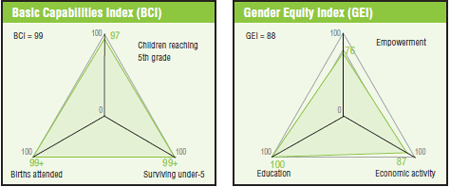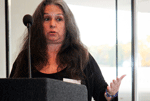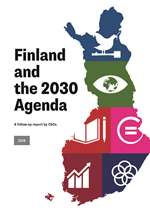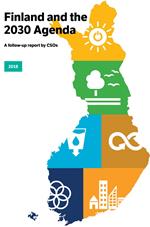Finland
Social security with inequalities and big footprint Finland: Social security with inequalities and big footprint
The presentation by Finland of its second VNR in 2020 initiated a new kind of cooperation between state authorities and civil society, with non-governmental actors presenting their assessment in the official report. Both views are largely in line, but civil society is more critical.
There is no extreme poverty in Finland and a comprehensive social security covers the whole population. Still there are challenges in relation to poverty and inequality. A crucial problem is that increasing in inequalities and social exclusion seem to accumulate and extend across generations, causing intergenerational transmission of poverty.
While gender equality situation is considered “good”, Finland is the second most violent EU country for women. As many as 47 per cent of Finnish women have experienced physical and/or sexual violence.
The biggest challenge of Finland is the consumption of raw materials. It is high in relation to gross domestic product and per capita, the highest in the world. Total energy consumption was 1.38 million terajoules in 2018, and 40 per cent of fossil fuels. Finland’s economy produced 0.21 kg of carbon dioxide per EUR 1 of GDP, more than double that of Sweden or Switzerland. The average material footprint among Finns is over 40 000 kg per person a year, and the trend is rising. The accounting of greenhouse gas emissions does not consider the impact of Finnish consumption beyond its national borders.
“Ecological footprint of Finland is more than three times larger than the global average and our consumption has negative effects abroad”, concludes the Finnish civil society report.

Published on Mon, 2020-11-02 15:43
The presentation by Finland of its second VNR in 2020 initiated a new kind of cooperation between state authorities and civil society, with non-governmental actors presenting their assessment in the official report. Both views are largely in line, but civil society is more critical.
There is no extreme poverty in Finland and a comprehensive social security covers the whole population. Still there are challenges in relation to poverty and inequality. A crucial problem is that increasing in inequalities and social exclusion seem to accumulate and extend across generations, causing intergenerational transmission of poverty.
|
Published on Thu, 2020-01-30 10:23
In Finland, the civil society report of Fingo, the association of Finnish development NGOs, concludes that “conflicts of interest between actors lead to decisions where a short-term economic advantage eclipses long-term sustainability.”
Finland claims to be “among the first to draft a national implementation plan, to initiate sustainable development budgeting, to establish an inclusive monitoring system and a citizens’ panel, and commission an external evaluation of the world's first national 2030 Agenda policy, the PATH2030 report published in March 2019”. Yet, the alternative report shows that Finland is not consistently committed to the human rights-based approach of the 2030 Agenda, to ensure that “no one is left behind”. Further, “the 2030 Agenda is widely known about in Finland, but there is no consistent understanding of its interpretation and political significance”.
|
Published on Mon, 2018-10-22 12:09
KEPA; the Finnish platform of civil society organizations, worries about the extraterritorial impact of Finland's production and consumption patterns.
“Almost half of Finland's water footprint is caused by production chains outside Finland” they argue as an example. Kepa reports that “there is no reliable or even partially comprehensive information available in Finland on the external impacts of Finnish consumption, i.e., how we exploit natural resources outside of our own country”. The Finnish Ministry of Finance initiated an assessment of the national budget from a sustainable development perspective. However, the initial work is judged “quite modest”. The budget proposal for 2019 is going to be estimated mainly from the climate change perspective, and will focus on the plans for Finland to become carbon neutral after having reached a historic high in carbon emissions in 2017. Kepa considers it “necessary to widen the approach of taking sustainable development into account in the budget planning” to cover other issues and “to look courageously at tax support for fossil fuels and other activities that may even conflict with sustainable development.”
|
Published on Thu, 2018-07-19 15:06
A group of CSOs share their long-term experience and knowledge of enhancing sustainable development. Each of the seven CSOs is responsible for its own area of expertise of the Finland and the 2030 Agenda follow up report.
The Finland and the 2030 Agenda follow up report provides information about the state of sustainable development in the country, describes visions about the the future and above all makes specific recommendations for decision-makers to carry out the objectives discussed in the report.
|
Published on Mon, 2017-07-10 13:58

Photo: Maailma Kylässä
|
The government published the national implementation plan of the SDGs in February 2017. Economic growth and business opportunities are emphasized throughout the plan. Several CSOs have been critical about this approach because it will not reduce global inequality or help conserve natural resources for future generations. The economy should be a tool to achieve sustainable welfare and growth should not be seen an absolute value as such. Finnish CSOs have underlined that the social and ecological responsibility in businesses requires, besides dialogue, binding legislation. France and the Netherlands have legislated recently that businesses active in these countries must take care of human rights along the entire supply chain.
|
Published on Fri, 2017-06-02 22:29

Photo: Maailma kylässä
|
The follow-up report of Government´s achievements in implementing the Agenda 2030 was published last weekend at World Village Festival in Helsinki. The report was prepared by ten Finnish organisations (The Finnish League for Human Rights, Kepa, Save the Children Finland, Plan International Finland, The Finnish Blue Ribbon, SOSTE Finnish Federation for Social Affairs and Health, The Finnish Association for Nature Conservation, Finnish Olympic Committee, Finnish Red Cross and WWF Finland), with each being responsible for its respective area of expertise. Other organisations have also contributed to the report.
Representatives of the CSOs handed over the reports to the Minister of Foreign Trade and Development Kai Mykkänen and Minister for Housing, Energy and Environment Kimmo Tiilikainen. After the ceremony a lively panel discussion together with representatives of different parliamentary parties was held. The amount of ODA -funding started a vivid debate. The cuts made from CSO funding were seen especially problematic. Minister Mykkänen made a promise to increase the ODA-funding after the huge cuts the current Government made at the beginning of its term of office.
|
Published on Fri, 2016-08-12 18:59
The main challenge in implementing the 2030 Agenda in Finland will be integrating the principles and targets of sustainable development into all of the country's domestic policies, including those policies related to developing countries. Genuine political commitment is a prerequisite for implementing the 2030 Agenda broadly and coherently throughout the public administration. Different stakeholders have to be engaged and also take responsibility for implementing the goals. Implementation has to be monitored not only globally but also regionally.
This requires sufficient planning, coordination and allocation of resources, which in turn requires political commitment to implementing the universal goals but also prioritizing policy actions in order to get a serious and efficient start. Committing to the goals means that attaining them is mainstreamed into all decision-making, and not just considered in a separate action plan. It is important to understand the 2030 Agenda in a holistic way, so that for example gender equality is not only a separate goal but also a cross-cutting theme.
|
Published on Thu, 2013-02-14 21:22
The Finnish government wants to be an accountable member of the international community, but its political will to be so does not always transpire. Finland has not, for example, been able to reach the 0.7 % target for its development funding.
|
Published on Mon, 2012-10-29 14:25

Anabela Lemos.
(Photo: Atte Keinänen/Kepa.)
|
"Land grabs" in the Global South have caused much debate and concern during the last couple of years, especially since the global food price crisis of 2008. Kepa, a platform for Finnish NGOs interested in development issues and focal point of Social Watch in that European country, held a discussion on the issue this month. Tuomo Alhojärvi wrote a report on the debate for Kepa’s website.
|
Published on Thu, 2012-09-06 09:05

Family ties are strong in rural
Kenya. (Photo: Barry Lewis
Corbis/Helsingin Sanomat)
|
Finland has certain problems: many people numb themselves with antidepressant drugs and alcohol, people bully and harass each other at work, a young man will fire into a crowd of people, a father kills his family. Finnish people should learn something from developing countries, wrote Johana Pohjola in an article published by Helsingin Sanomat daily newspaper.
|
Published on Fri, 2011-08-05 07:43
Source: Helsingin Sanomat
Concerns about climate change and about the future of the planet were given the most weight by the readers of Helsingin Sanomat (HS), a Finnish newspaper, when they voted on what they considered to be the most unethical product in the world.
|
|










